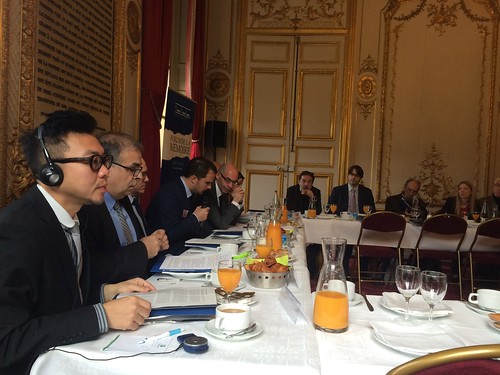My speech at a hearing on “Obstacles to Democratisation in Thailand” at the French Senate, Paris, 5 April 2016.
I would like to focus mainly on current politics of Thailand, particularly on obstacles to Thai democratisation in the aftermath of the 2014 coup.

Me at the hearing, the Senate, French Republic
Thailand’s political crisis began following the overthrowing of the elected government of Thaksin Shinawatra in 2006, and was further deepened by the 2014 coup, which removed his sister, Yingluck, from the premiership. In both coups, the main justification for the military’s intervention in politics was supposedly to rid corruption from politics. It is true that corruption has remained one of the main obstacles to democratisation in Thailand. But the real cause behind the long-drawn crisis is more complicated than many would admit.
At the root of the crisis lies in the denial of the traditional elites to come to terms with Thailand’s changing political, economic and societal landscape. In the last few decades, Thailand’s socio-economic advancement has outgrown the country’s political development. The once marginalised residents in the north and northeast regions of Thailand, while enjoying better social and economic livelihood as a result of Thailand’s fast-paced growth, demanded wider access to political resources, which had been long-time monopolised by political elites. When Thaksin won the election in 2001, he opened up a political space for fairer competition through electoral politics and in the process empowering those marginalised residents while turning them into loyal supporters of his party.
I am not saying that Thaksin was a role model for democracy. In fact, he became a part of a larger problem facing Thailand’s democracy. This is not to mention that Thaksin was successful in forming an authoritarian majority in the parliament, harassing his opponents, censoring the media, and committing extra-judicial killings against the Southern insurgents and local drug lords. But in the end, the Thaksin era was cut short. What represents a more deep-rooted issue for Thai democracy has been the traditional elites’ persistence in demeaning the democratic process. And this has been done through a series of military coups, apparently endorsed by the palace, as a way to eliminate political threats.
As Thailand has arrived at a critical royal transition, the traditional elites, of which the military is a part, have become even more anxious about what Thailand would become in the post-succession period. In past years, King Bhumibol Adulyadej had successfully ensured the nation’s political stability. But his era is coming to an end. The future remains uncertain and the politics inside the palace also remains unpredictable. This sense of anxiety drove them to once again adopt the crudest way of protecting their political benefits—through the coups.
In the period leading up to the royal succession, the military has striven to achieve two objectives. First, as the royal succession is the key to shaping the future of Thai politics, the military is aiming to stay in power for as long as possible in order to make sure that that the succession would be smooth and trouble-free and that their interests would be well preserved—even when this must be done at the expense of bypassing the democratic process. In the meantime, should the military be forced to step down, perhaps due to increasing domestic or international pressure, it has sought to install a necessary “infrastructure” in politics so as to be able to hold onto power from behind the scenes.
Building the necessary political infrastructure is now done through the drafting of a seemingly non-democratic constitution. This is a setback for Thai democracy. The first draft of the constitution was disapproved by parliament and the second one, now completed, is awaiting approval through a possible referendum in the next few months. Why is the drafting of this constitution posing as an obstacle to Thailand’s democracy? This is simply because it would serve to shrink the democratic space, rather than widening it. First, the junta handpicked the drafting committees; it was not done by popular mandate. In the new draft, there are several provisions, which are designed to give the upper hand to the traditional elites in the continued process of dominating the Thai political domain. This includes an attempt to empower the Senate (whose members would all be appointed), and also ‘independent’ organisations (such as the Constitutional Court, the Administration Court, the National Anti-Corruption Agency, the Human Rights Commission and the Election Commission, etc), assigning them as instruments of the old power in challenging the position of future elected governments. A provision is also written to allow future prime ministers to be unelected appointees, possibly paving the way for unelected old generals to hold the premiership. Moreover, the constitution permits independent candidates to run in an election—this stresses an effort to break down the domination of powerful parties, like that of Thaksin. Ultimately, the democratic process would be manipulated, still by the old power—we could anticipate future governments to be weak, or shaky coalitions, being maneuvered by the traditional elites who are not willing to push for political reforms, as they have claimed.
Recommendations? What could Europe/France do to help promote democratisation in Thailand? An endeavour may begin with a serious review of sanctions against the Thai junta. Both the EU and USA have until now imposed what I see as “soft sanctions” against the military regime; this encouraged the military to feel more confident in its staying power and to continue to disparage the democratisation process. The fact that Thailand is cosying up with China, and in so doing compelling the USA and EU to take into account the impacts caused by Thailand being drawn into the Chinese orbit, seems to compromise the values and principles of the West, especially in adamantly campaigning for greater democratisation in Thailand. Another endeavour may include working closely with European embassies in Bangkok, local NGOs and alternative media, as well as in reaching out to local communities, in strengthening ideas and opinions on democracy and rights to protect civil liberties. I realise that this might already be an ongoing project of certain European nations in their works with local NGOs and alternative media, but a more determined commitment is needed, particularly in demonstrating more strongly to the junta that the EU/France cares about human rights and democracy in Thailand, as well as about condemning the illegitimate regime and pressuring them to return power to the Thai people.
Note: this version of my speech has been amended to avoid discussing sensitive issues regarding the monarchy.
 Pavin Chachavalpongpun is Associate Professor at the Center for Southeast Asian Studies, Kyoto University
Pavin Chachavalpongpun is Associate Professor at the Center for Southeast Asian Studies, Kyoto University
Prachatai English is an independent, non-profit news outlet committed to covering underreported issues in Thailand, especially about democratization and human rights, despite pressure from the authorities. Your support will ensure that we stay a professional media source and be able to meet the challenges and deliver in-depth reporting.
• Simple steps to support Prachatai English
1. Bank transfer to account “โครงการหนังสือพิมพ์อินเทอร์เน็ต ประชาไท” or “Prachatai Online Newspaper” 091-0-21689-4, Krungthai Bank
2. Or, Transfer money via Paypal, to e-mail address: [email protected], please leave a comment on the transaction as “For Prachatai English”
